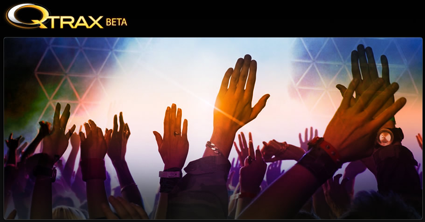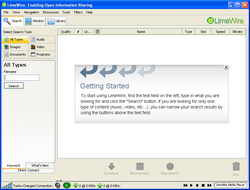Tag: p2p
Norwegian TV broadcaster puts own series on BitTorrent
BitTorrent and P2P file-sharing is KILLING the music, film and TV industries, right? If this madness doesn’t stop, in ten years time David Letterman and Jonathan Ross will be starving on the streets, and the Eastenders budget will be so meagre that every episode will take place entirely in the Queen Vic’s gent’s loo.
QTRAX launches, claiming legal access to 30 million tracks. Server overwhelmed

QTRAX, which originally launched back in 2002 but closed down due to avoid the risk of legal action, has relaunched today.
It claims that users will be able to find and download between 25 and 30 million copyrighted music tracks, with the blessing of a large proportion of the music industry.
“QTRAX is a magical and game-changing service that revolutionizes the way fans consume digital music,” said QTRAX President and CEO Allan Klepfisz.
Well, possibly not revolutionary. We’ve seen a shift towards “free” ad-supported music streaming and download services recently.
Want to know about file-sharing? Ask a nine-year-old girl…
 Despite the music industry’s crackdown on illegal P2P file-sharing, there’s still a lot of people doing it – and many of them are kids. So why haven’t they been put off by the legal threats? TorrentFreak decided to ask one, a nine year-old girl called ‘Hannah’ (not her real name, and no, that’s not her in the picture).
Despite the music industry’s crackdown on illegal P2P file-sharing, there’s still a lot of people doing it – and many of them are kids. So why haven’t they been put off by the legal threats? TorrentFreak decided to ask one, a nine year-old girl called ‘Hannah’ (not her real name, and no, that’s not her in the picture).
P2P site, OiNK, shut down by pigs, sorry, police
 Oink! Oink! One of the largest sources of illegally-downloaded music, OiNK, has been closed down by the pigs, sorry, British and Dutch police. Oink! Ok, I’ll stop now…
Oink! Oink! One of the largest sources of illegally-downloaded music, OiNK, has been closed down by the pigs, sorry, British and Dutch police. Oink! Ok, I’ll stop now…
Interpol shut it down in the early hours of this morning, after a chap in Middlesbrough was arrested today on counts of conspiracy to defraud and infringement of copywright law, after leaking 60 massive pre-release albums this year to the members-only site. Due to the popularity of the P2P site, us casual…
How P2P influenced Pussycat Dolls singer Nicole Scherzinger's release schedule
 If you’re a music industry bigwig, chances are you think P2P file-sharing is The Devil’s Work. Well, at least, that’s what you’ve got to say in public, even if you do go home and spend the night trousering as much free music as you can. Anyway, the point is, major labels don’t like P2P.
If you’re a music industry bigwig, chances are you think P2P file-sharing is The Devil’s Work. Well, at least, that’s what you’ve got to say in public, even if you do go home and spend the night trousering as much free music as you can. Anyway, the point is, major labels don’t like P2P.
However, following the leak of a bundle of emails from anti-piracy company MediaDefender, it seems some labels are using P2P as a guide to which songs they should release. Specifically, Pussycat Dolls singer Nicole Scherzinger’s label Interscope asked MediaDefender to monitor how popular one of her album tracks was on file-sharing services.
P2P file sharing could cut up to 95% off video hosting costs
A new study suggests that video publishing services such as YouTube and MSN Video could save up to 95% of their bandwidth costs by implementing some kind of peer-to-peer file sharing system. Researchers from Microsoft in collaboration with the Polytechnic…
The latest wheeze to punish P2P downloaders: bill them!
 US firm Nexicon says it’s signed up “a motion picture studio” for its GETAMNESTY program, which aims to charge P2P downloaders for the files (films, in this case) that they’ve illegally downloaded.
US firm Nexicon says it’s signed up “a motion picture studio” for its GETAMNESTY program, which aims to charge P2P downloaders for the files (films, in this case) that they’ve illegally downloaded.
Nexicon hasn’t named the studio, so it’s unclear whether it’s one of the big guys or not. I’m a bit unclear on how GETAMNESTY works, other than the original press release’s promise that it “enables copyright owners to identify violators with precision, document specific copyright infringements perpetrated by the same infringer, and obtain compensation efficiently and cost effectively”.
EU court rules telecom companies don't have to hand over details of suspected illegal file sharers
Possible good news for those who operate file sharing networks for distributing music and other media via the likes of KaZaA and other software. A top European Union court has ruled, in the civil case of Spanish music and audiovisual…
P2P file sharing now includes voting
 Thanks to MP3 Rocket, a tweaked version of the Limewire P2P piracy solution.
Thanks to MP3 Rocket, a tweaked version of the Limewire P2P piracy solution.
Version 5.0 of MP3 Rocket lets users vote on which they like the most…


















